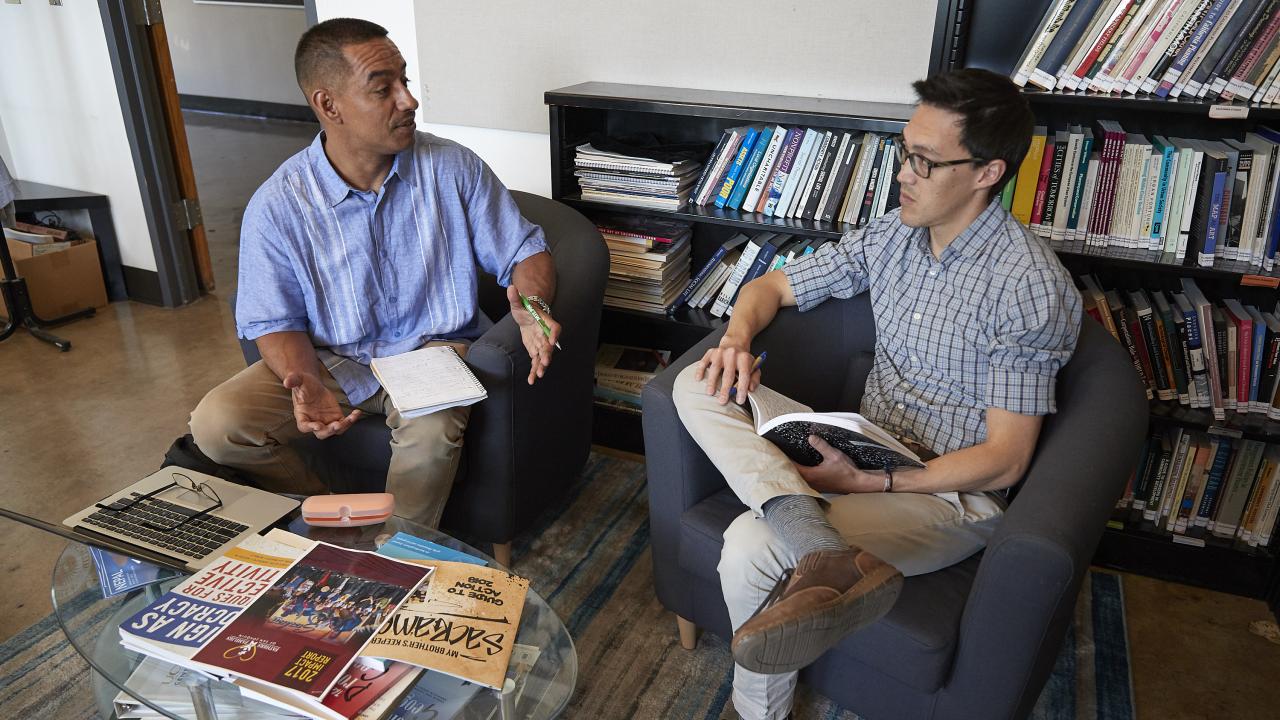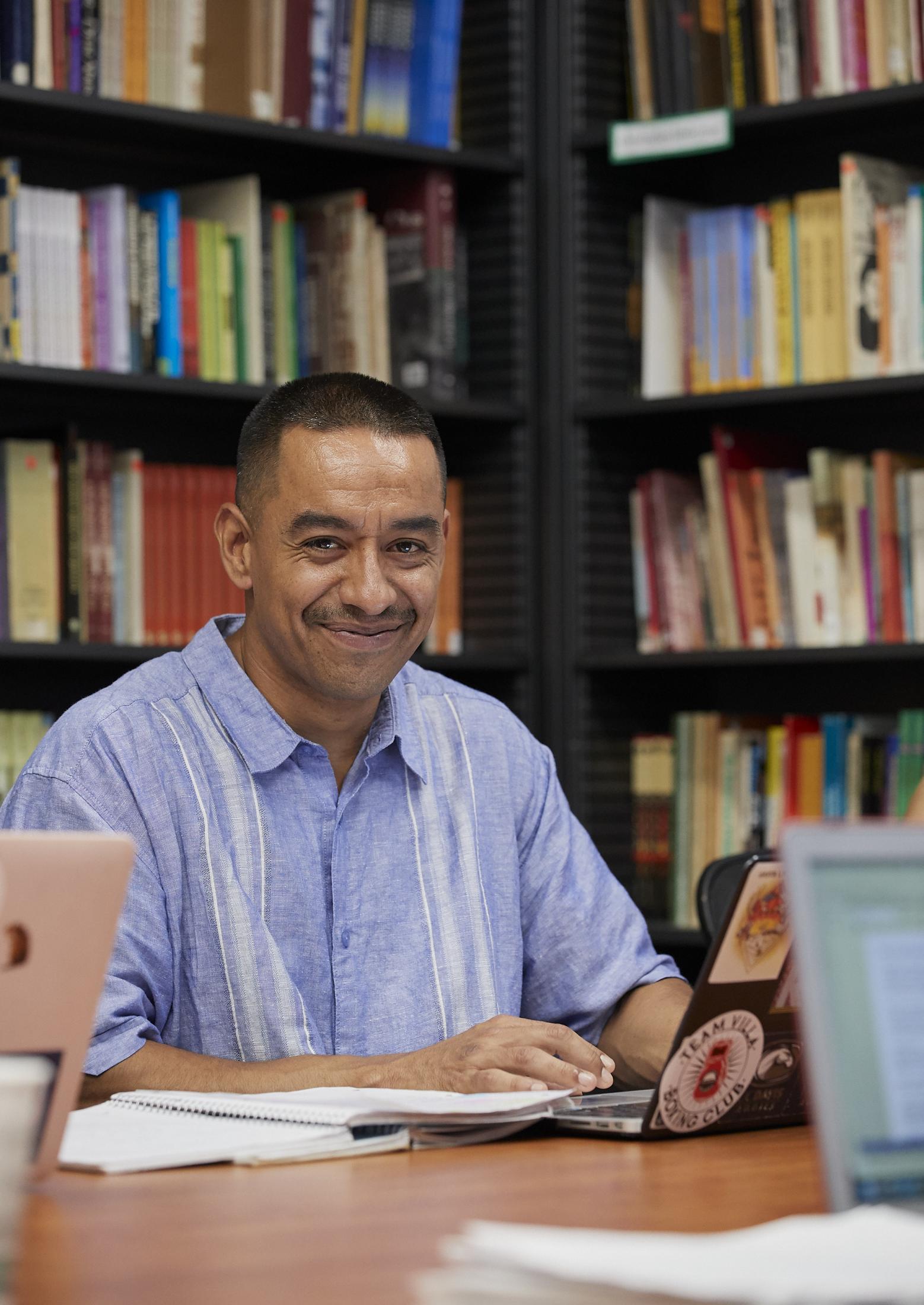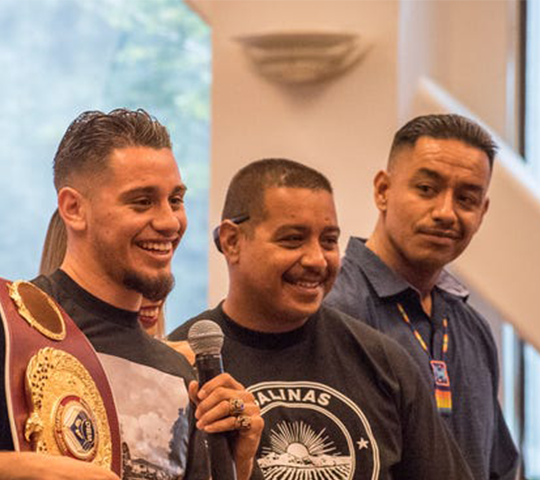
Reversing the School to Prison Pipeline
How one UC Davis student is changing the narrative around incarceration
By Sarah Colwell
Statistically speaking, George Villa shouldn’t have been a college student. Villa studied community and regional development at UC Davis – after serving a cumulative 13-plus years in prison.
He used his experience not only to serve as an example to his fellow students and professors, but to help connect UC Davis to marginalized youth in the region.
The son of field workers, Villa felt the impact of his Central Valley neighborhood where drugs and violence were commonplace, and where many of his family and friends ended up in prison. Villa, unfortunately, succumbed to this environment and was incarcerated at a young age because of a bar fight. He then spent the next few years in and out of the correctional system — starting in youth detention and ending up in a state penitentiary.

According to a 2018 report by the U.S. Department of Justice, Villa’s story of recidivism is all too common. Within the first year of their release, 44 percent of individuals who leave state prisons have been arrested again and by the ninth year, a staggering 83 percent of those released have been rearrested.
“When I got out I felt like I wasn’t good enough for society. Coming home, I was really ‘messed up,’” he said, “But eventually I told myself, no more. I wanted to make my parents happy. I was ready to come home and stay home.”
Although Villa was determined not to go back to prison, staying out had its challenges. He had to check in with a parole agent who, Villa felt, was looking for an excuse to send him back to prison. Villa also dealt with the challenges of finding a job after incarceration. Most importantly, he needed to find healing for his soul.
“I had to work on trauma, PTSD. And it took a lot of vulnerability and tears and expressing myself, especially in front of men,” Villa said. “I had to go back to the roots of my Native American culture. I experienced a lot of hardship, pain, and agony - but I also experienced a lot of triumphs and joys on this journey.”
Challenging the college student stereotype
As Villa worked to surround himself with positive influences, his journey led him to community college and eventually UC Davis — making him the first in his family to attend college.
As a student at UC Davis, Villa was trying to change the narrative of what what a college student is like and bring a new perspective to the classroom.
“Even for my professors, there are things that I’ve experienced that you can’t get from a book,” he said. “I think a lot of professors are fascinated by how I’ve been able to transition from prison and reintegrate into society and make it.”
Villa continued, “I got to experience a lot of the systemic, punitive practices that create a prospect of misery for families. That’s why I want to be an advocate for changes to the policies that disproportionately affect people of color. I have to be a voice of how a person can come out of incarceration and successfully reintegrate into society.”
Leading the way
While attending UC Davis, Villa worked for the UC Davis Center for Regional Change (CRC), a research center that brings together faculty and students from different disciplines, and builds bridges between university, policy, advocacy, business, philanthropy and other sectors. Through CRC, Villa worked as the logistics and communications coordinator for Neighborhoods Owning Power, Action, and Leadership. He also supported projects for Motivating Individual Leadership for Public Advancement and Sacramento Area Youth Speaks (SAYS), among various other commitments and activism efforts. One of his proudest accomplishments was helping to build a community garden in South Stockton because it helped to improve the local environment and brought people together.
“We partnered with landscape architecture students from UC Davis and youth and residents of Stockton. We all got to know each other and worked on environmental justice workshops,” he said. “There were just so many positive things that came from the work we did.”
Villa’s community engagement doesn’t end there. Villa participated in the UC Davis Guardian Scholars Program, one of the first of its kind in the country devoted to helping former foster youth obtain higher education degrees. Villa is part of a foster-care support group and also mentors freshmen at UC Davis. His is also a strong advocate for Beyond the Stats, an organization that supports UC Davis students who were previously incarcerated, and frequently volunteers at Yolo County Juvenile Hall to show young people in the criminal justice system they can still do something positive with their lives.
Outside of UC Davis, Villa started the nonprofit Team Villa boxing gym in East Salinas with his brother and leads a weekly physical fitness program for the children of farm workers. These programs are designed to provide structure for children and teach youth how to maintain a healthy lifestyle.
“I just want to be a spark to light a positive fire in these young people,” said Villa, “We have to recruit young people into our village, or they are going to burn it down.”

Salinas native Ruben Villa fights for a boxing world title — with a city and community behind him
Team Villa Gym, where Villa prepares for each of his fights, opened up training sessions for kids and adults alike to train last year. "I want them to see that someone like me, like them, can make it," Villa said. "They just got to put in the time and the effort like I did and keep chasing it."
Those who know him agree, what is so remarkable about Villa is not just what he does for others, but how he does it. “He bridges these two worlds like only he can,” said a colleague at UC Davis, “and he does so with incredible grace, determination, humility, honesty, vulnerability, optimism, and love.”
About UC Davis Public Scholarship and Engagement
Public Scholarship and Engagement (PSE) is fostering a culture of engagement at UC Davis that increases the university’s impact through mutually-beneficial relationships that have local, regional, statewide, and global reach.
We envision UC Davis research, teaching and learning that serves society and makes a positive difference in the world.
